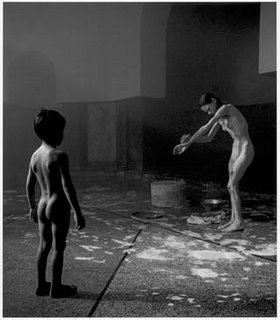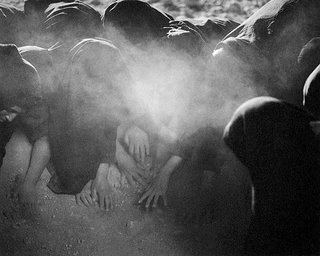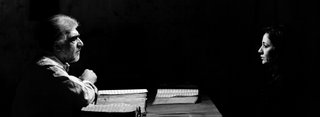"Men are the loosers of the future" states a big headline in today's edition of the Danish newspaper Politiken.
According to the Economic Council of the Labour Movement the Danish labour market will lack 136.000 skilled workers and 66.000 persons with a higher education in 2015. In turn there will be 135.000 unskilled workers in surplus.
"It will be men who will be in trouble," says managing director Lars Andersen from the Economic Council of the Labour Movement. There is a big difference between the educational pattern of men and women: Today half of Denmark's young women goes for higher education whereas only 37 percent of the young men has chosen university or the like. He explains:
"The young women's educational profile is a better fit for the future's labour market than that of the men. The men are in high risk of becoming the future's loosers."
This is sad news. There are of course no good biological reasons for men to have less motivation for higher education than women - so something must be very wrong with the way that men are taught to be men.
The new report is just another proof how crucial it is that we escape traditional gender roles and reinvent what it means to be 'a man' and 'a woman'.
What's up, Europe? Gender, media and European integration. The story of a a young Dane exploring the continent.
Monday, August 28, 2006
Sunday, August 27, 2006
Famous feminist #3
 "Have you any notion how many books are written about women in the course of one year? Have you any notion how many are written by men? Are you aware that you are, perhaps, the most discussed animal in the universe?"
"Have you any notion how many books are written about women in the course of one year? Have you any notion how many are written by men? Are you aware that you are, perhaps, the most discussed animal in the universe?"Virginia Woolf (1882-1941) is a British author who made an original contribution to the form of the novel - also distinguished feminist essayist, critic in The Times Literary Supplement, and a central figure of Bloomsbury group.
Virginia Woolf's concern with feminist thematics are dominant in "A room of one's own" (1929). In it she made her famous statement: "A woman must have money and a room of her own if she is to write fiction." The book originated from two expanded and revised lectures the author presented at Cambridge University's Newnham and Girton Colleges in October 1928. Woolf examined the obstacles and prejudices that have hindered women writers. She separated women as objects of representation and women as authors of representation, and argued that a change in the forms of literature was necessary because most literature had been "made by men out of their own needs for their own uses." In the last chapter Woolf touched the possibility of an androgynous mind. Woolf refers to Coleridge who said that a great mind is androgynous and states that when this fusion takes place the mind is fully fertilized and uses all its faculties. "Perhaps a mind that is purely masculine cannot create, any more than a mind that is purely feminine..." 'Three guineas' (1938) urged women to make a claim for their own history and literature.
Source: kirjasto.sci.fi
Saturday, August 26, 2006
I'd rather be a Cyborg than a goddess
 What you are about to read is really a curiosity.
What you are about to read is really a curiosity.Last year I stumbled over the notion of "cyber feminism". American Professor Donna Haraway is the woman behind the remarkable 'ism' and the idea is that feminists and women should consider that machines can contribute to liberation and close the gender gap. She writes:
“Up till now (once upon a time), female embodiment seemed to be given, organic, necessary; and female embodiment seemed to mean skill in mothering and its metaphoric extensions. Only by being out of place could we take intense pleasure in machines, and then with excuses that this was organic activity after all, appropriate to females”
Read more in Haraway's cyborg manifesto
Thursday, August 24, 2006
Wednesday, August 23, 2006
My inner European
Speaking of European integration.
| Your Inner European is Dutch! |
 |
The heart of Europe
I just spent two great days in Amsterdam where I met up with my fellow students from the Erasmus Mundus programme. I haven't seen them for almost two months so I was of course really glad to be reunited.
After a couple of days of relaxation in one of my favourite European cities I moved on to Brussels where I will stay for about a month to do an internship. I have been wanting to work in Brussels for a looong time so I am quite excited to start tomorrow.
Before leaving Amsterdam one of my friends there asked me if I was an Euro-skeptic. My spontanious answer was 'no'. I have never really been that skeptic about the EU and European integration. I guess I am something as rare as an Euro-optimist.
From today I am an Euro-optimist in EU-land.
After a couple of days of relaxation in one of my favourite European cities I moved on to Brussels where I will stay for about a month to do an internship. I have been wanting to work in Brussels for a looong time so I am quite excited to start tomorrow.
Before leaving Amsterdam one of my friends there asked me if I was an Euro-skeptic. My spontanious answer was 'no'. I have never really been that skeptic about the EU and European integration. I guess I am something as rare as an Euro-optimist.
From today I am an Euro-optimist in EU-land.
Monday, August 14, 2006
Famous feminist #2
 Shirin Neshat was born in Iran in 1957, and presently lives and works in New York. The way in which she gives form to her theme makes the tensions between her original background and Western culture visible.
Shirin Neshat was born in Iran in 1957, and presently lives and works in New York. The way in which she gives form to her theme makes the tensions between her original background and Western culture visible.When she was 17 Shirin Neshat moved from the land of her birth to Los Angeles, to begin her studies at an art academy. The Iranian Revolution broke out while she was in the United States, and Ayatollah Khomeini came to power. Under his regime women were required to wear the chador. Sixteen years later, in 1990 she revisited her fatherland for the first time. This renewed acquaintance made deep impression on her.
Since then Neshat focused on investigating and commenting on her relation to her homeland and Islam, and in particular the position of women and male/female relationships. For this she draws on two very different cultural backgrounds, using their insights to examine large, underlying social themes.
Source: Stedelijk Museum, Amsterdam
Zarin, 2005 (video) 

Passage, 2001 (video)
The Last Word, 2003 (video)
Thursday, August 10, 2006
Famous feminist #1

Simone de Beauvoir (January 9, 1908 – April 14, 1986) was a French author and philosopher. She is best known for her 1949 treatise Le Deuxième Sexe (The Second Sex), a detailed analysis of women's oppression and a foundational tract of contemporary feminism.
As an existentialist, de Beauvoir accepts the precept that existence precedes essence; hence one is not born a woman, but becomes one. Her analysis focuses on the concept of The Other. It is the (social) construction of Woman as the quintessential Other that de Beauvoir identifies as fundamental to women's oppression.
De Beauvoir argues that women have historically been considered deviant, abnormal. She says that this attitude has limited women's success by maintaining the perception that they are a deviation from the normal, and are outsiders attempting to emulate "normality". For feminism to move forward, this assumption must be set aside.
De Beauvoir asserted that women are as capable of choice as men, and thus can choose to elevate themselves, reducing male consciousness to immanence.
Source: Wikipedia.org
Monday, August 07, 2006
Paternal leave
Today the free Danish daily MetroXpress featured a story about parental leave.
"There is a trend towards fathers getting harassed if they express their desire to take parental leave. We have heard about reactions as 'you can forget all about it' and 'your wife can do that, not you'," says Jane Korczak fra 3F, the biggest Danish trade union.
According to 3F and other trade unions many fathers even get sacked by their employers if they wish to take parental leave.
By Danish law fathers have the option to to take 32 weeks of the total parental leave - but it is only a possibility, not a right.
This is a truly unsatisfying situation for both men and women. Fathers should have the right to take half of the leave - just as mothers should have the right not to take it. Come on, politicians - help the families and earmark half of the parental leave for the father.
"There is a trend towards fathers getting harassed if they express their desire to take parental leave. We have heard about reactions as 'you can forget all about it' and 'your wife can do that, not you'," says Jane Korczak fra 3F, the biggest Danish trade union.
According to 3F and other trade unions many fathers even get sacked by their employers if they wish to take parental leave.
By Danish law fathers have the option to to take 32 weeks of the total parental leave - but it is only a possibility, not a right.
This is a truly unsatisfying situation for both men and women. Fathers should have the right to take half of the leave - just as mothers should have the right not to take it. Come on, politicians - help the families and earmark half of the parental leave for the father.
Sunday, August 06, 2006
Let us move beyond the sex and beauty stuff
After a fun night out with some good friends I stumbled over a stack of free gay&les magazines. With usual curiosity and my fetish for printed things (magazines, leaflets, brochures, posters... you name it, I'll grab it!) I took a copy with me home. After a long night in town I passed out instantly and forgot all about the magazine until my hangover was gone the next day.
But then... it was really an interesting reader! Besides the theme "what is queer?" which was one of the reasons the magazine appealed to me in the first place (my growing feminist awareness have led me to be interested in the notion of 'queer') it was really nice to experience how political it was. These people have their sexual orientation in common, but the publication was not all about sex and how to be attractive - thank god NO!
It made me think about how utterly dull women's magazines are. We lack to see equal pay, women are significally underrepresented in top management and only 1 percent of the world's property is owned by women but still the seven or eight magazines for women we have in Denmark all write about the same things: sex, relationships, the newest self-help books, interior decoration and beauty tips. Isn't it time to try out something new?
Be political!
But then... it was really an interesting reader! Besides the theme "what is queer?" which was one of the reasons the magazine appealed to me in the first place (my growing feminist awareness have led me to be interested in the notion of 'queer') it was really nice to experience how political it was. These people have their sexual orientation in common, but the publication was not all about sex and how to be attractive - thank god NO!
It made me think about how utterly dull women's magazines are. We lack to see equal pay, women are significally underrepresented in top management and only 1 percent of the world's property is owned by women but still the seven or eight magazines for women we have in Denmark all write about the same things: sex, relationships, the newest self-help books, interior decoration and beauty tips. Isn't it time to try out something new?
Be political!
Friday, August 04, 2006
Imagine Bush
 'Imagine this' is an audio mash up of president Bush singing the John Lennon hit 'Imagine'.
'Imagine this' is an audio mash up of president Bush singing the John Lennon hit 'Imagine'.Just imagine.
Subscribe to:
Comments (Atom)


